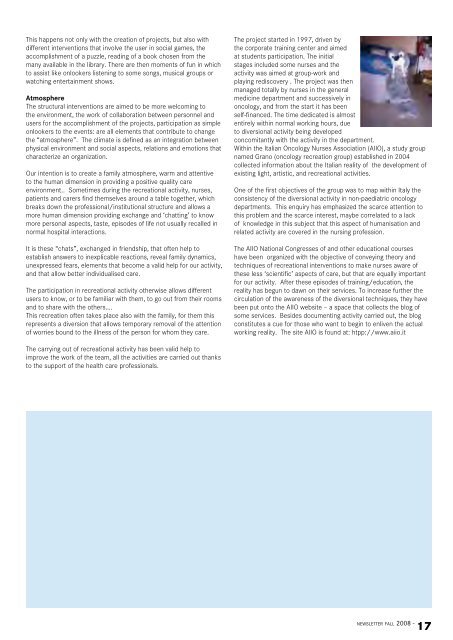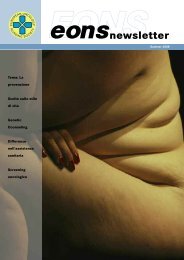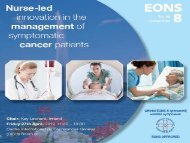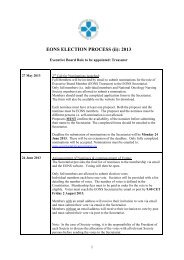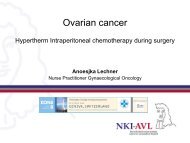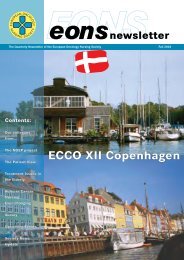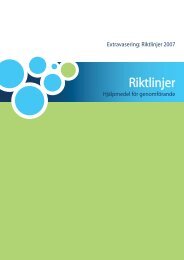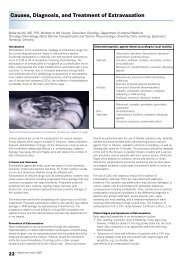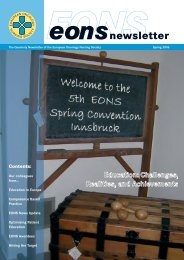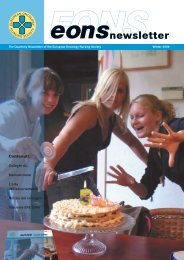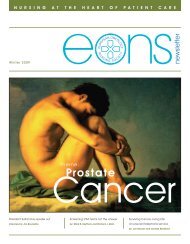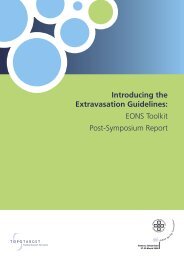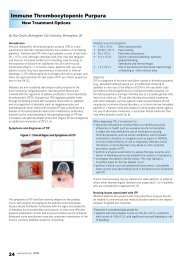Diversional activity deficitRecreation and activities in <strong>the</strong> oncology settingPatrizia D’Amico, Roberto Quarisa, Servizio di Oncologia Medica, Ospedale di Ivrea (TO), Italia, translation of <strong>the</strong> original version ofSarah Liptrott, <strong>European</strong> <strong>Oncology</strong> Institute, Milano“Diversional activity deficit” is one of <strong>the</strong> nursing diagnoses identifiedfrom <strong>the</strong> NANDA in 2005 (00097, II, 2005).The work of ‘recreation’ has progressed now for 10 years in <strong>the</strong>department of oncology at Ivrea Hospital, near Torino, and is aconcrete response to this diagnosis. It consists of a general series ofinterventions, between <strong>the</strong> areas of creative activity and occupational<strong>the</strong>rapy, to be performed when <strong>the</strong> onset of inadequate activity of <strong>the</strong>patient is identified or anticipated.We work in a medical oncology department, composed of aninpatient unit with twelve beds, a day hospital, an outpatient serviceand a service welcome centre (CAS). Our ‘users’ are adults, usuallyover 50 years of age.Participating can take attention away from <strong>the</strong> symptom – it can bereduced or disappear temporarily. Also immobility is not an obstacle,some small pieces of work can be carried out in bed, surpassingphysical handicap. Sometimes <strong>the</strong> participation stimulates leaving <strong>the</strong>bed area and taking individuals to a communal area.EnvironmentCarrying out this activity allows us to go and to act in an environmentthat constantly changes because it is staged and modified accordingto <strong>the</strong> different seasons and for <strong>the</strong> different events that characterizeour lives. The time outside of <strong>the</strong> ward becomes lived also inside withpreparations created by <strong>the</strong> patients and personnel. The seasons –holidays like Christmas, Epiphany and carnival, so important in ourtown for <strong>the</strong> oranges-battle! – are remembered in our ward: <strong>the</strong> snowthat comes down from above, <strong>the</strong> flags of <strong>the</strong> carnival, grapes andautumnal leaves… recreate symbolic objects that evoke <strong>the</strong> “time” ofdaily life.In alternative to <strong>the</strong>se moments, each person researches topicsaround which to create <strong>the</strong> objects of <strong>the</strong> projects: Threedimensionalanimals made with card, rubbish bags, glue, colouredcard, plastic bottles; coloured stained-glass windows made with cardand tissue paper;Larger objects; showcases for <strong>the</strong> postcards and for <strong>the</strong> photographs;large cardboard silhouettes.Usually <strong>the</strong>y use cheap materials, recovered, recycled (above allpacking materials), easily available. However we have available forevery activity scissors, glue, staplers, string, adhesive tape, wire,thumb tacks, fishing line, coloured cards, tempera, paint, felt-tip pen,tissue paper, crepe paper.In our hospital as in <strong>the</strong> majority of hospital departments in Italy, <strong>the</strong>absence of pleasant and diversional activites and <strong>the</strong> cold and clinicalenvironment, emphasize and sometimes increase <strong>the</strong> perception of<strong>the</strong> symptoms and <strong>the</strong> sense of isolation that oncological illness cancause. Also if <strong>the</strong> range of service ‘users are diverse in relation to ageand social status’ , <strong>the</strong> problem can be amplified. Depressed statesand apathy are often present in <strong>the</strong>se types of patients.Throughout <strong>the</strong>se activities, we aim to face <strong>the</strong> onset of <strong>the</strong>seinconvenient situations. Our recreational interventions aimessentially to make participants profit from light creative activity to fill<strong>the</strong> long empty spaces of hospitalization.The activity is proposed to every individual, dedicating <strong>the</strong> timedeemed convenient; it is personalized allowing creativity, manualability, artistic skill and potential, even if this means discovering anability that <strong>the</strong>y did not think <strong>the</strong>y had. Also where <strong>the</strong>re are highlevels of fatigue, <strong>the</strong>y can participate, showing <strong>the</strong>refore that even <strong>the</strong>presence of <strong>the</strong> symptoms leaves some margin for activity.The choice of <strong>the</strong> topic to be developed is by chance – a proposalfrom whoever has an idea: users, family, personnel… will find ideaor activity <strong>the</strong>y like, begin work and leave it on <strong>the</strong> table in <strong>the</strong>department and very slowly it is built upon. We aim to realize everyproposal, looking not to be repetitive, and for this reason, at <strong>the</strong>end of <strong>the</strong> period, <strong>the</strong> arrangement is dismantled completely andeliminated, recycling only <strong>the</strong> material still useable. In this waywe do not run <strong>the</strong> risk of same projects every year, stimulating <strong>the</strong>construction of new ideas.Often <strong>the</strong> project is not of high quality and during its realisation smallinconveniences occur or <strong>the</strong> aes<strong>the</strong>tic result is not that desired. , Forus it is not important, <strong>the</strong> thing that we aim for is participation in <strong>the</strong>accomplishment…all that is realized, is meaningful for <strong>the</strong> individual.Timing• The long moments of inactivity that characterize a hospitalizationbring into focus <strong>the</strong> changes in life that cancer causes, redefininglong term objectives and often favouring a state of depression.These recreational interventions aim to allow individuals whowish to participate in different activities, to avoid <strong>the</strong> situation ofdepression.- newsletter fall 200816
This happens not only with <strong>the</strong> creation of projects, but also withdifferent interventions that involve <strong>the</strong> user in social games, <strong>the</strong>accomplishment of a puzzle, reading of a book chosen from <strong>the</strong>many available in <strong>the</strong> library. There are <strong>the</strong>n moments of fun in whichto assist like onlookers listening to some songs, musical groups orwatching entertainment shows.AtmosphereThe structural interventions are aimed to be more welcoming to<strong>the</strong> environment, <strong>the</strong> work of collaboration between personnel andusers for <strong>the</strong> accomplishment of <strong>the</strong> projects, participation as simpleonlookers to <strong>the</strong> events: are all elements that contribute to change<strong>the</strong> “atmosphere”. The climate is defined as an integration betweenphysical environment and social aspects, relations and emotions thatcharacterize an organization.Our intention is to create a family atmosphere, warm and attentiveto <strong>the</strong> human dimension in providing a positive quality careenvironment.. Sometimes during <strong>the</strong> recreational activity, nurses,patients and carers find <strong>the</strong>mselves around a table toge<strong>the</strong>r, whichbreaks down <strong>the</strong> professional/institutional structure and allows amore human dimension providing exchange and ‘chatting’ to knowmore personal aspects, taste, episodes of life not usually recalled innormal hospital interactions.It is <strong>the</strong>se “chats”, exchanged in friendship, that often help toestablish answers to inexplicable reactions, reveal family dynamics,unexpressed fears, elements that become a valid help for our activity,and that allow better individualised care.The participation in recreational activity o<strong>the</strong>rwise allows differentusers to know, or to be familiar with <strong>the</strong>m, to go out from <strong>the</strong>ir roomsand to share with <strong>the</strong> o<strong>the</strong>rs….This recreation often takes place also with <strong>the</strong> family, for <strong>the</strong>m thisrepresents a diversion that allows temporary removal of <strong>the</strong> attentionof worries bound to <strong>the</strong> illness of <strong>the</strong> person for whom <strong>the</strong>y care.The project started in 1997, driven by<strong>the</strong> corporate training center and aimedat students participation. The initialstages included some nurses and <strong>the</strong>activity was aimed at group-work andplaying rediscovery . The project was <strong>the</strong>nmanaged totally by nurses in <strong>the</strong> generalmedicine department and successively inoncology, and from <strong>the</strong> start it has beenself-financed. The time dedicated is almostentirely within normal working hours, dueto diversional activity being developedconcomitantly with <strong>the</strong> activity in <strong>the</strong> department.Within <strong>the</strong> Italian <strong>Oncology</strong> Nurses Association (AIIO), a study groupnamed Grano (oncology recreation group) established in 2004collected information about <strong>the</strong> Italian reality of <strong>the</strong> development ofexisting light, artistic, and recreational activities.One of <strong>the</strong> first objectives of <strong>the</strong> group was to map within Italy <strong>the</strong>consistency of <strong>the</strong> diversional activity in non-paediatric oncologydepartments. This enquiry has emphasized <strong>the</strong> scarce attention tothis problem and <strong>the</strong> scarce interest, maybe correlated to a lackof knowledge in this subject that this aspect of humanisation andrelated activity are covered in <strong>the</strong> nursing profession.The AIIO National Congresses of and o<strong>the</strong>r educational courseshave been organized with <strong>the</strong> objective of conveying <strong>the</strong>ory andtechniques of recreational interventions to make nurses aware of<strong>the</strong>se less ‘scientific’ aspects of care, but that are equally importantfor our activity. After <strong>the</strong>se episodes of training/education, <strong>the</strong>reality has begun to dawn on <strong>the</strong>ir services. To increase fur<strong>the</strong>r <strong>the</strong>circulation of <strong>the</strong> awareness of <strong>the</strong> diversional techniques, <strong>the</strong>y havebeen put onto <strong>the</strong> AIIO website – a space that collects <strong>the</strong> blog ofsome services. Besides documenting activity carried out, <strong>the</strong> blogconstitutes a cue for those who want to begin to enliven <strong>the</strong> actualworking reality. The site AIIO is found at: htpp://www.aiio.itThe carrying out of recreational activity has been valid help toimprove <strong>the</strong> work of <strong>the</strong> team, all <strong>the</strong> activities are carried out thanksto <strong>the</strong> support of <strong>the</strong> health care professionals.newsletter fall 2008 -17


